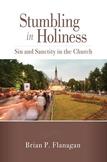Review: A holy and sinful church
This past Advent, many of us were eager to turn the page to a new liturgical year. Perhaps, more honestly, we yearned to leave behind the past year in the church, plagued as it was by yet another wave of revelations, this time from Pennsylvania, of horrific crimes against children and the systematic coverup to which the hierarchy of the church seems perpetually inclined. The pain of polarization in the church and the nation seem to feed off each other, intensifying our desire to start anew, to renew ourselves, our church and our faith. For some, this past year has meant a confrontation with the reality of sin in the church, while others have reached a breaking point, writing off the church as irreparable and renouncing their membership.
Brian Flanagan does a great service to both these contingents in his book Stumbling in Holiness by taking a closer look at the realities of sin and holiness in the church. Flanagan’s careful, granular analysis of both holiness and evil, as these terms apply individually and collectively to Catholics and to the church, confronts the sin of the church in all its discomfiting reality. The sins committed individually by Christians, and collectively by churches and hierarchies, are neither glossed over nor accepted as inevitable features of humanity. But Flanagan’s work also helps guide those who would give up on an institution they see as hopelessly flawed to a new appreciation of the complexity of a reality where God’s grace and human sin coexist in personal, collective and structural ways.
For some, this past year has meant a confrontation with the reality of sin in the church, while others have reached a breaking point.
Throughout, the work remains grounded in its liturgical starting point and therefore represents another step forward in elaborating an ecclesiology “from the bottom up,” rather than one that proceeds deductively from doctrinal pronouncements to embodied reality. In his close attention to the reality of holiness, sanctity and the indefectibility of the church, Flanagan takes on such neuralgic issues as the “creeping infallibility” that has plagued the Catholic Church since the late 19th century and the use of exclusively feminine pronouns for the church. (Hint: Patriarchy conditions us to treat as abstractions the realities of both “church” and “woman” leaving little room for actual ecclesial communities and actual women’s experiences to be heard and valued, so Flanagan advocates a turn to neutral pronouns for the church, a move with which many feminist theologians heartily agree.)
Of the many valuable contributions this volume makes to theology broadly, and contemporary ecclesiology specifically, perhaps the most important are Flanagan’s guidelines for speaking about a holy and sinful church. Flanagan invites scandal-plagued Catholics to face the reality of our sin with renewed hope with helpful rules, which include never speaking about one reality ( holiness) without acknowledging the other reality (sin); clearly stating the historical sinfulness of the church in order to spur ecclesial repentance; and acknowledging that our faith, along with God’s promise, ensures that the church “is a pilgrim, and not simply a wanderer” on an eschatological journey to union with God. It is difficult to imagine a better gift for the New Year.
This article also appeared in print, under the headline “A holy and sinful church,” in the February 4, 2019, issue.










